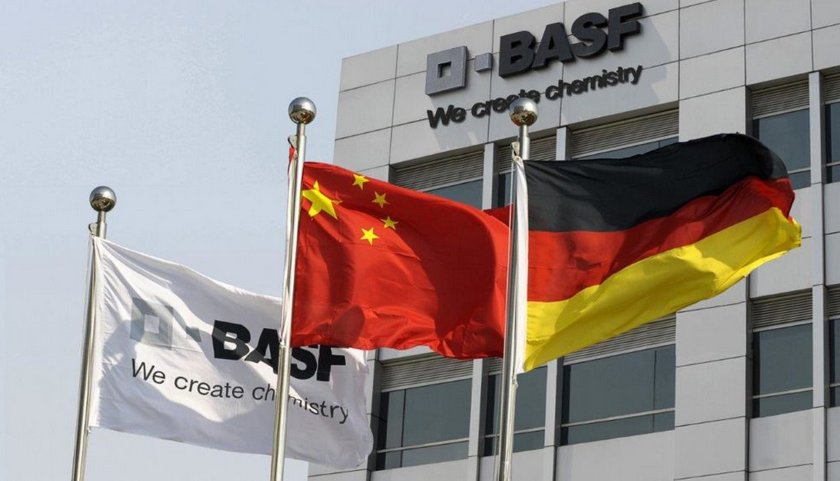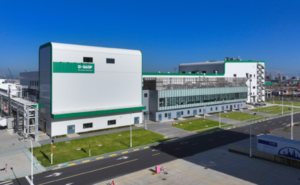ZHANJIANG/MANNHEIM – Germany-based chemicals maker BASF last week announced the launch of a technology center in Zhanjiang, Guangdong province. It is the first corporate scientific research and innovation platform the group has established in South China.
The center is located at the heart of BASF’s 10-billion-euro ($10.8 billion) Verbund site being built in the city and will focus on the research of Verbund process optimization, digitalization, and sustainable development.
Haryono Lim, president of the group’s megaprojects in Asia, said the center will serve as a nucleus to stimulate more Made-in-Zhanjiang innovations. “It is another important step on our path of building the Zhanjiang Verbund site as a lighthouse project”, he added.
The Zhanjiang Verbund site, involving BASF’s largest single investment and wholly owned by the group, will ultimately become the group’s third-largest production site worldwide, following Ludwigshafen in Germany, and Antwerp in Belgium.
Since its inauguration in 2019, construction at the Zhanjiang site has been steadily progressing, said Lim. The first two plants of engineering plastic compounds and thermoplastic polyurethane were put into use in September 2022 and January of this year respectively.
In addition, the site’s core device construction is in full swing and is expected to be completed at the end of 2025 as scheduled.
According to the Zhanjiang government, seven more major projects have recently started construction at the city’s Economic and Technological Development Zone during the first quarter, with a total investment of 2.14 billion yuan ($297.3 million).
Among them, Guangdong Minghao Chemicals’ project, with an investment surpassing 490 million yuan, for example, will mainly develop new chemical materials and high-end fine chemicals by making full use of the opportunities and resources offered by BASF’s Verbund site and the construction and expansion of Sinopec’s refining and chemical integration project in the city.
Relying on a batch of leading projects, Zhanjiang is promoting the upgrading of industrial cooperation; accelerating the coordinated development of the manufacturing industry; adhering to the integration of industrialization, ecology, and digitalization; and building three world-class port industrial clusters of green steel, green petrochemical and green energy, local officials said.
Over the past few years, the city has nurtured four 100-billion-yuan industrial clusters of green petrochemicals, modern agriculture and food; advanced materials; and new energy, helping to drive the vigorous development of other industries.
In 2021, the total output value of the green petrochemicals industrial cluster reached over 100 billion yuan, making it the first in Zhanjiang to reach the milestone.
According to a government work report delivered by the city’s Mayor Zeng Jinze on Feb 4, Zhanjiang implemented 53 key construction projects in the manufacturing industry in 2023, with a total investment of 26.12 billion yuan, an increase of 76.7 percent year-on-year and ranking first in the province.
Among them, BASF’s Verbund site completed an investment of more than 10 billion yuan; the hydrogen-based shaft furnace of Baosteel Zhanjiang Iron and Steel was put into operation; and the first phase of the Lianjiang nuclear power plant project — the first coastal nuclear power project developed and constructed by State Power Investment Corp in Guangdong — completed an investment of 5.71 billion yuan.
In the government work report, Zeng said Zhanjiang will keep a close eye on the extension and improvement of key industry chains this year, and promote the deep integration of leading enterprises with the local economy.
It will push forward the construction of Baosteel Zhanjiang Iron and Steel’s zero-carbon high-grade thin steel plate plant, and accelerate the construction of the core device at BASF’s Verbund site.
More efforts will be made to develop the green food processing and manufacturing industry and build a modern agriculture and food industry cluster.
Also, Zeng said Zhanjiang will highlight the independent innovation of the iron and steel industry; make breakthroughs in hydrogen metallurgy technology; promote the computer numerical control of key production processes and the digitalization of production equipment.
Moreover, the city will devote more resources to accelerating the digital transformation of traditional industries, as well as to deepen the application of the Internet of things and boost product innovation and upgrading in this field.
To create new quality productive forces, Zhanjiang plans to take strategic emerging industries and future industries as the core, and focus on the development of such sectors as new energy, new materials, low-altitude economy, and artificial intelligence, Zeng said.
Source: China Daily


